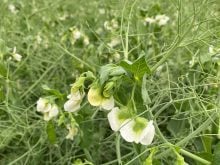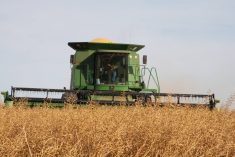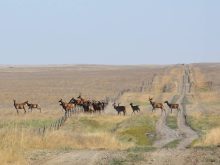Survey conducted on beef carcasses
Alberta Agriculture’s food safety division has developed a method for swabbing beef carcasses in provincially licensed abattoirs to test for generic micro-organisms.
The project will determine the numbers and types of pathogens on beef carcasses and help with ongoing food safety surveillance.
For more information, telephone 780-644-1464 or contact Saida Essendoubi at saida.essendoubi@gov.ab.ca.
AWC Calls for Nominations
The Alberta Wheat Commission is accepting nominations for two directors and three regional representatives in region three as well as a director-at-large position.
Read Also

Crop quality looks good this year across Prairies
Crop quality looks real good this year, with the exception of durum.
Farmers are encouraged to nominate peers who could represent producers in their region and work with the commission’s management team throughout the year.
Individuals can also put their name forward.
Nomination forms must be returned to the commission’s office by Oct. 30 for region three positions and elections will take place in Lacombe Nov. 2. The director-at-large nomination must be done by Dec. 15 with the election happening Jan. 27.
For more information, visit albertawheat.com.
Milk donation made to local food banks
The Mainland Milk Producers Association is donating $100,000 worth of locally produced milk to British Columbia food banks in Chilliwack, Mission, Abbotsford, Langley and Surrey.
The association, which comprises 350 dairy farmers, will provide fresh milk for up to a year.
Up to 485 families and Surrey’s Tiny Bundles Program will receive the funding. Families will receive jugs of fresh two percent milk, while the Tiny Bundles Program will receive one litre jugs of homogenized and one percent milk.
Food bank executives said the donation would have a substantial impact, considering that one of every three food bank users is a child.
Blackleg survey
The Smoky Applied Research and Demonstration Association, based in central Alberta, is doing a blackleg survey and looking for input from those already scouting canola fields.
The fungal canker or dry rot disease causes stem girdling and lodging. Up to 100 percent of the stem may be infected in heavily infested crops, which results in major yield loss.
Weakly virulent and virulent are the two types of blackleg fungus that infect canola. Weakly virulent has always been common in canola fields.
The disease is spread by infected seed or spores carried by rain and wind in growing crops.
It is spread long distances by the movement of infected seed.
For more information, visit the SARDA website.
Award recognizes pulse promoter of the year
Nominations will be accepted until Nov. 20 for the Pulse Promoter of the Year Award.
BASF Canada, a long-time partner of the award, will again provide a $1,000 WestJet gift certificate to the winner.
Saskatchewan Pulse Growers has presented the award since 1994. It recognizes an individual who has made noteworthy contributions in production, research or business innovation in the industry.
Previous years’ recipients were recognized for their work in areas such as production and plant breeding.
For more information, visit saskpulse.com.
Ontario ag college renames livestock dept.
The Ontario Agricultural College’s Department of Animal and Poultry Science has been renamed the Department of Animal Biosciences.
The rebranding will reflect the department’s evolution from a livestock husbandry department in the 1870s to the current integrated department.
It works in genetics, physiology, welfare and behaviour, animal models for health, animal metabolism, reproduction, nutrition, equine management, animal care and the social and environmental effects of livestock and companion animals.














